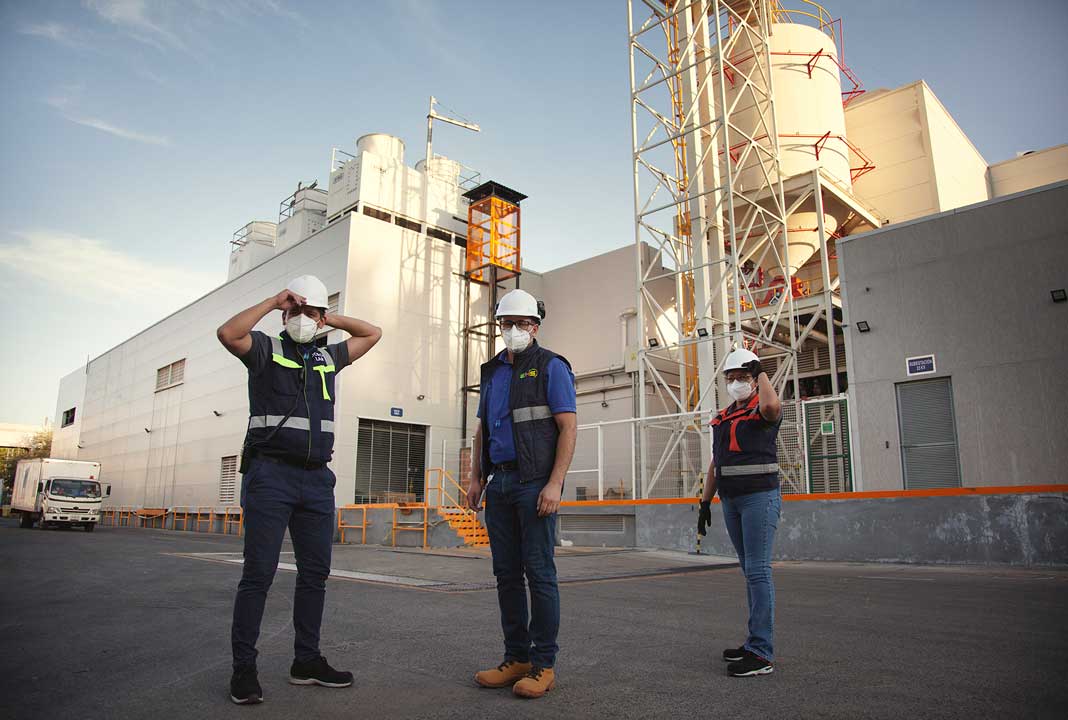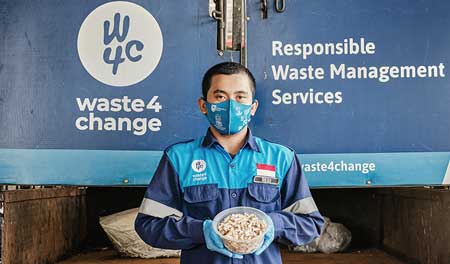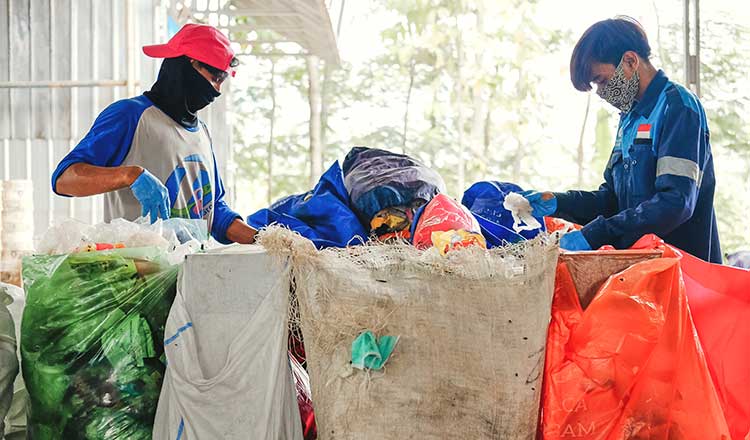| INTEGRATED REPORT 2020 |
PMI has been recognized as a climate leader, and we continue working closely with our suppliers to achieve our science-based targets.
Topic description
For PMI, climate protection means mitigating climate change by reducing greenhouse gas (GHG) emissions and energy consumption while adapting to climate change by improving resilience across our value chain.
Climate protection is a tier 1 topic within our strategic pillar Protecting the environment.

Our progress in 2020
read more
The right thing to do
The business case
We recognize climate change as both a risk and an opportunity. It changes weather patterns, which is particularly important for businesses like ours with an agricultural supply chain. Climate change also threatens facilities and operations, supply and distribution chains, as well as access to power networks and water. At PMI, we are taking steps to strengthen our resilience to climate impacts, reduce our GHG emissions, apply innovative low-carbon technologies, and support policies enabling a smooth transition to a low-carbon economy. Consistently, we voice support for national and global climate policies that help us plan for business growth, as we believe that effective climate policies give us more certainty for short-and long-term planning and investments, as well as help us better anticipate regulatory risks and seize economic opportunities. Moreover, we have reviewed our approach to carbon pricing, which we see as a powerful tool to consider the potential impact of external carbon taxes. But beyond helping mitigate risk related to investments that could become stranded with carbon-constrained regulation, shadow carbon pricing and carbon levy allows us to be more efficient and communicate to stakeholders, including investors, how we are making decisions, efficiently managing the shift from high-carbon to low-carbon activities.
Our aims:
Carbon neutrality
Achievement of carbon neutrality of PMI’s
direct operations (scope 1+2) by 2025
Net-zero emissions
Achievement of net-zero emissions of PMI’s
value chain (scope 1+2+3) by 2040
Engaging suppliers
PMI's critical suppliers to adopt science-based targets (SBTs) in line with PMI's own, aligned with the 1.5°C pathway necessary to meet the goals of the Paris Agreement
Achieving our aims
Our climate strategy aims to address pertinent climate change risks and build resilience while seizing opportunities presented by a low-carbon future. To deliver on our climate ambition, we rely on robust carbon footprint accounting, sound analysis of climate change-related risks and opportunities, ambitious targets, clear management and governance structures, and key enablers such as our internal carbon pricing.
The past year marked a milestone in our sustainability journey, as many of our targets had been set against 2020. We achieved or exceeded most of them. As anticipated in our previous report, we scaled up our ambition and further strengthened our climate strategy in 2020, leveraging the progress made so far.
Based on our performance, we believe we can achieve our aim of carbon neutrality in our direct operations by 2030 significantly sooner. Likewise, we remain committed to achieving net-zero emissions across our value chain by 2050.1
To achieve our carbon-neutrality targets, we focus primarily on reducing absolute carbon emissions. To guide our work in the years to come, we revised our absolute CO2e emission reduction targets in 2020 to align with a scenario of an increase in global temperatures of no more than 1.5 degrees Celsius above pre-industrial levels. In doing so, we aligned with the recommendations of the Intergovernmental Panel on Climate Change (IPCC) 2018 report. We also updated our baseline, moving it from 2010 to 2019, to account for changes in our footprint and business model.
Our new targets, assessed and approved by the Science-Based Targets initiative (SBTi) in 2020, commit us to:
- Reducing our absolute scope 1+2 GHG emissions by 50 percent by 2030 from a 2019 base year
- Reducing our absolute scope 3 GHG emissions by 50 percent within the same timeframe2
To deliver on our targets, we take a holistic, three-part approach to emissions reduction: First, we seek to reduce consumption and optimize efficiency. Second, we minimize the use of fossil fuels and promote the switch to renewable energy. Third, once we have maximized our emissions reduction, we compensate for the remaining unavoidable emissions. When possible, we prioritize in-setting projects in our supply chain; alternatively, we purchase certified carbon credits.
Our carbon-neutrality work covers our entire value chain, which extends from the supply of tobacco and other materials to the production, packaging, commercialization, use, and end-of-life of our products. Guided by our footprint model, we have targets and tailored strategies in place that take into consideration the most significant climate impacts across our value chain.
Our approach to decarbonizing our operations and value chain is guided by several corporate policies. Reducing energy consumption and carbon emissions is embedded in our Environmental Commitment, our Guidebook for Success (PMI’s Code of Conduct), our Responsible Sourcing Principles, and our Good Agricultural Practices program; our efforts to protect forests, as a fundamental climate-regulation mechanism, are in accord with our Zero Deforestation Manifesto. Our well-established environmental management system, based on international standards such as ISO 14001, supports the implementation of our environmental policies across our operations.
1Net zero GHG emissions are achieved when anthropogenic emissions are balanced globally by anthropogenic removals over a specified period (source: World Resources Institute).
2 The boundary of our targets includes biogenic emissions and removals from bioenergy feedstocks.
Stakeholder engagement
We know that partnership is critical to successfully addressing climate change and achieving UN SDG 13 (“take urgent action to combat climate change and its impacts”). PMI partners, supports, participates, and is a member of sustainability-related initiatives and organizations such as the World Business Council for Sustainable Development (WBCSD), Business for Social Responsibility (BSR), CSR Europe, and the We Mean Business coalition, which harness the power of collaboration to implement solutions at scale. In 2020, our CEO joined in an open letter from CEOs from over 170 businesses, investors, and business and investor networks, in a letter to call on EU policymakers to support an EU 2030 GHG emissions reduction target of at least 55 percent. Moreover, following the establishment of our new science-based emissions reduction targets consistent with keeping global warming to 1.5 degrees Celsius above pre-industrial levels, we signed the Business Ambition for 1.5°C commitment—responding to the call-to-action for companies to step up their ambition for the best chance of tackling the climate crisis. Our affiliates also belong to national business associations that are engaging with governments to advance progress on climate protection at the local level.
We have received external recognition for our efforts, achieving the highest possible score of 100 in the climate strategy, environmental reporting, and environmental policy and management systems categories of the 2020 Dow Jones Sustainability Index. We disclose our efforts to the CDP annually, and in 2020 we achieved a “triple-A” score for sustainability leadership and maintained our position on the A-List for Climate Change for the seventh year in a row.
Assessing climate change risks and opportunities
In conjunction with our integrated risk management process, we periodically conduct a climate change risks and opportunities assessment to fully understand PMI’s impact across our entire value chain. This work aligns with international expectations such as those of the Paris Agreement to mitigate and adapt to climate impacts, as well as the recommendations of the Task Force on Climate-related Financial Disclosures (TCFD).
Our most recent risk assessment was conducted in 2019 and reported on in our last report as well as in our submission to the CDP.

Strong action must be taken to reduce the risks of climate change impacts and stop the destruction of nature. At PMI, we are investing in innovative programs and taking a multidisciplinary approach to reduce the environmental impact of our products, operations, and value chain.
Governance and management
PMI’s governance and management systems aim to ensure that climate-related risks and opportunities are considered in relevant decision-making processes. The Nominating and Corporate Governance Committee of PMI’s Board of Directors (BoD) oversees the company’s sustainability strategies and performance, including climate change-related issues and initiatives aimed at eliminating negative impacts of our business on the environment. The Audit Committee of the BoD oversees the assessment and management of company risks, including those related to climate change, such as natural disasters, water scarcity, and agricultural supply chain instability.
A member of the Company Management, the Senior Vice President (SVP), Operations, is tasked with addressing climate change risks, including physical and water-related risks, across all company activities. In 2020, this person reported to PMI’s Chief Operating Officer, who himself reported directly to the CEO. He monitored and reviewed progress against objectives, strategies, and action plans related to climate change, and reported findings to the Nominating and Corporate Governance Committee and Audit Committee of the BoD.
As of May 2021, the SVP, Operations reports directly to and regularly updates PMI’s CEO on climate issues and has operational responsibility, including maintaining robust business resilience, risk assessment processes, and strategies to support business continuity. He examines and monitors issues related to climate change, ensuring that risk assessment and management are integrated into long-range plans, objectives, budgets, and performance review processes.
From an operational perspective, our Operations, Product, Consumer, Commercial, and Finance functions coordinate the company’s climate change-related activities. Most of the coordination is done by the Sustainability team and takes place in the context of sustainability-related working groups and with local market coordinators.

We strongly believe that PMI must play its part in protecting our planet by reducing our environmental impact across our value chain and by defining and executing strategies and initiatives to achieve our long-term targets. Our business and sustainability strategies are advancing hand in hand with increasing momentum. As we transform our company, we are also accelerating our sustainability efforts to achieve a smoke-free and more sustainable world.
This helps ensure that our global strategies and programs can be implemented at the market level and that local realities are reflected in our global efforts.
We incentivize our tobacco leaf buyers, procurement managers, environmental managers, and other relevant employees through monetary rewards or other forms of recognition for the successful implementation of GHG emission reduction projects, climate change mitigation activities, and behavioral change toward climate protection. We also seek to sensitize our entire workforce to the issue of climate change through regular internal communication and training of all employees in PMI’s manufacturing facility in Guadalajara, Mexico.

Our progress in 2020
read more
Performance metrics
view dataThis online content about our Integrated Report should be read in conjunction with PMI’s 2020 Integrated Report. The information and data presented here cover the 2020 calendar year or reflect status at December 31, 2020, worldwide, unless otherwise indicated. Where not specified, data come from PMI estimates. Please also refer to 'About this report' on page 3 of the 2020 Integrated Report for more information. Aspirational targets and goals do not constitute financial projections, and achievement of future results is subject to risks, uncertainties and inaccurate assumptions, as outlined in our forward-looking and cautionary statements on page 145. In the 2020 Integrated Report and in related communications, the terms “materiality,” “material,” and similar terms, when used in the context of economic, environmental, and social topics, are defined in the referenced sustainability standards and are not meant to correspond to the concept of materiality under the U.S. securities laws and/or disclosures required by the U.S. Securities and Exchange Commission.






